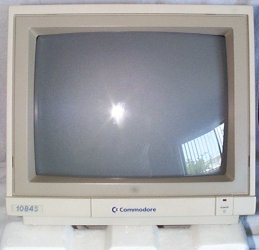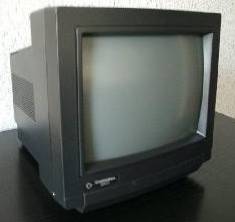


Black 1084S-D2 which was designed for use with the CDTV
Download 1084 Manual (English, French and German)
Download 1084S Manual (English, French and German)
Picture Tube : 14 inch, in-line slotted, pitch .42mm
Display Screen : 13 inch, measured diagonally
Deflection : 90°
Monitor input sockets for RGB signals:
1) 9-pin D : RGB Analog 0.7 P-P, 75 Ohm
DIN connector : RGBI Digital TTL Levels
Resolution : 640 x 200 lines, 640 x 400 lines interlaced
Characters : RGB, RGBI, 2000 characters, Composite, Seperated LCA, 1000 characters
Raster Frequency : 60Hz
Line Frequency : 15750Hz
Sound Output : 1WRMS
Audio Signal : 1.0V P-P, 47K Ohm
Mains Voltage : 120 VAC, 60Hz
Power Consumption : 75W
Dimensions (H x W x D) : 330 x 357 x 378 mm
Weight : 11 kg
Looking at the back of the monitor
Digital Analog
Pin Number TTL Mode RGB Analog Mode
1 Ground Ground
2 Ground Ground
3 Red Red
4 Green Green
5 Blue Blue
6 Intensity N/C
7 N/C Composite Sync
8 Horiz.Sync N/C
9 Vert. Sync N/C
1084 Sub-Models
The 1084 and its variants (1084S, 1084S-P, 1084-P, 1084S-P2, 1084-D, 1084S-D) are all 15.75 kHz monitors. They do not handle AGA "double" screenmodes, nor will they display the deinterlaced output from the A2320 Amber board or the motherboard deinterlaced output on an A3000. However, they will show all normal 15.75 kHz displays, and many (most? all?) of the 1084 versions have a separate input for composite video.
The 1084 is a usually a variation of the Philips CM8833 monitor; the 1084S-D was made by Daewoo (as was the 1084D, probably). The display tubes used in these monitors were made by Orion, Toshiba, Hitachi, and Samsung.
At one time or another, every possible permutation of connectors and video capabilities on the 1084 seems to have been reached, so don't be surprised if your 1084 has some bizarre combination of connectors and specifications.
Common Problems
The 2080 is a long-persistance phosphor, .39 mm dot pitch.
Specifications
Sync Frequency 15.75 kHz (NTSC; 15.6 kHz PAL)
Pin-Outs (Analog RGB, 6-Pin DIN)
Pin 1: Green
Pin 2: Horizontal Sync
Pin 3: Ground
Pin 4: Red
Pin 5: Blue
Pin 6: Vertical Sync
Pin-Outs (Digital RGBI, 8-Pin DIN)
Pin 1: Unused
Pin 2: Red
Pin 3: Green
Pin 4: Blue
Pin 5: Intensity
Pin 6: Ground
Pin 7: Horizontal Sync
Pin 8: Vertical Sync
Pin-Outs (1084S DB9)
Pin 1: Ground
Pin 2: Ground
Pin 3: Red
Pin 4: Green
Pin 5: Blue
Pin 6: Unused
Pin 7: Composite Sync
Pin 8: Horizontal Sync
Pin 9: Vertical Sync
Thanks to Greg Scott (National Amiga), Iggy Drougge, Olivier Croquette, NicDouille and Warren Block